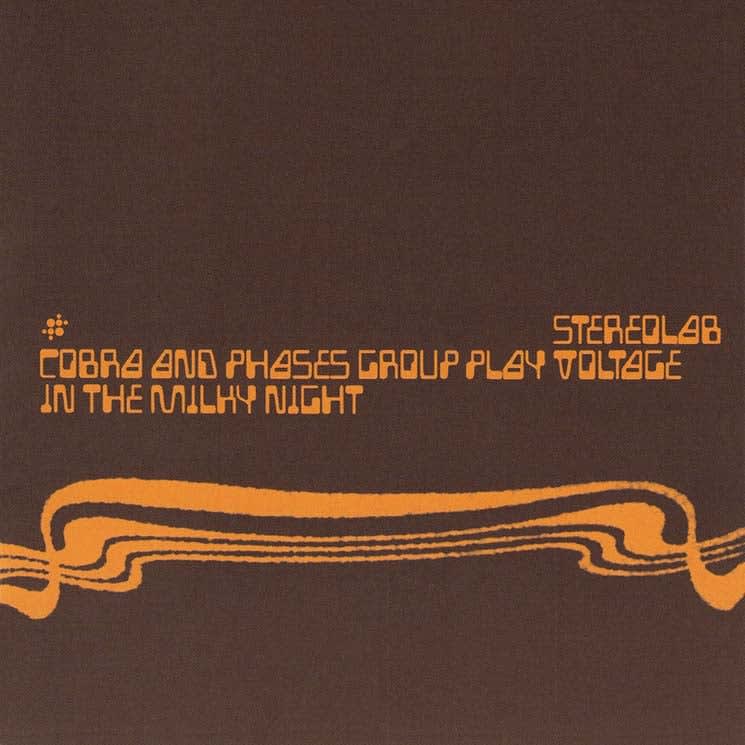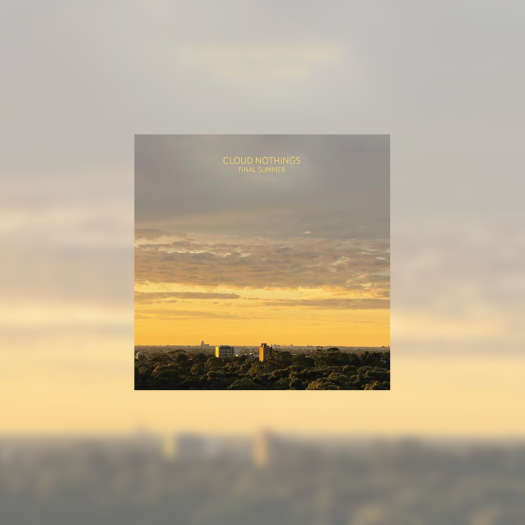It's a good thing that Twitter wasn't around 20 years ago. If the internet was what it is now back in 1999, when Stereolab released their sixth full-length, founding members Tim Gane and Laetitia Sadier would still be getting notifications from all the flame war chains.
Apparently, Cobra and Phases Group Play Voltage in the Milky Night pissed a lot of people off when it was released, and not for having a title that would do Fiona Apple proud. The album received a middling response from the biggest magazines of the day, such as Rolling Stone, Q and Spin, while NME actually compared the English-French outfit to Hitler for it, as if Gane and Sadier took up painting and genocide between albums.
Pitchfork gave Cobra and Phases a pathetic 3.4 rating, to go along with one of the most pretentious pieces of scribble ever gibbered (seriously, their "review" contained a disparaging email from Jesus Christ, a mock-diary entry from Karl Marx and an elevator pitch for a Louie Anderson/Burt Bacharach movie). To date, the album still has the lowest rating of Stereolab's entire discography on AllMusic, which lamented that it was "their first record since Transient Random Noise Bursts to not be fully realized."
Well, I don't hate breaking it to you, but all of those idiots were wrong. All things considered, Cobra and Phases is actually one of the best albums Stereolab ever made. It simply had the misfortune of attempting to follow up the two best albums they ever made, 1996's Emperor Tomato Ketchup and 1997's Dots and Loops. Compared to them, any change in direction would be seen as jarring.
What seemed to unbalance the cultural elite at the time was the overly jazzy aspect felt throughout Cobra and Phases. John McEntire (Tortoise) and Jim O'Rourke (Sonic Youth) played a significant role in the production and performance of the record, imbuing the groop's typical sunshine psychedelic avant-pop with a dose of progressive jazz-fusion. Given the number of chefs in this kitchen, which included heavy support from touring keyboardist Sean O'Hagan and idiophonist Dominic Murcott, both of the High Llamas, as well as various string and brass contributions, the cohesion of the album is remarkable.
"Fuses" sets the pace, launching into an absurd blast of melted brass, loony percussion, groovy guitar, skeletal vibraphone, and ghostly wordless vocals. The momentum rarely yields from that point onward.
Tracks like "The Spiracles," with its sweeping orchestral strings and trudging electric harpsichord, and the atmospheric downtempo of "Velvet Water" let the listener to catch their breath amidst pure jams like "Op Hop Detonation," which peaks with funky clavinet, trumpet, guitar, and psychedelic synth, and the manic motorik drive of "Strobo Acceleration." The arpeggiated marimba and soaring strings that kick in halfway through "Puncture in the Radax Permutation" create a sense of cinematic menace.
Throughout the album, Sadier's voice is as strong, evocative and creatively employed as ever. She delivers her usual standard of poetic and politically charged lyrics, while her voice is employed most playfully as an aural accompaniment, like the scat-like soundsmithing in the background of "Blips, Drips, and Strips" that eventually takes centre stage. All the gains she makes are matched by the scintillating guitar and psychedelic synth work of Gane, together concocting the perfect blend of French chanson, Brazilian MPB, Italian pop, German kosmiche and '60s jazz-fusion.
If there is anything bad about it, one could say Cobra and Phases is too focused. It's such a singular vision that the mind tends to blur as the album progresses, being so dense and consistent that it is difficult to hold the whole album between your ears, especially when you hit the ten-minute mark of "Blue Milk."
The best advice would be to simply relax and let this album take you where it wants to go, rather than try to make it fulfill the unrealistic expectations that were built up before it. You may like where you end up. Plus, the 20th anniversary reissue contains demo versions for just about every track on the original, so you can see how they got there more clearly than ever.
(Warp / Duophonic UHF Disks)Apparently, Cobra and Phases Group Play Voltage in the Milky Night pissed a lot of people off when it was released, and not for having a title that would do Fiona Apple proud. The album received a middling response from the biggest magazines of the day, such as Rolling Stone, Q and Spin, while NME actually compared the English-French outfit to Hitler for it, as if Gane and Sadier took up painting and genocide between albums.
Pitchfork gave Cobra and Phases a pathetic 3.4 rating, to go along with one of the most pretentious pieces of scribble ever gibbered (seriously, their "review" contained a disparaging email from Jesus Christ, a mock-diary entry from Karl Marx and an elevator pitch for a Louie Anderson/Burt Bacharach movie). To date, the album still has the lowest rating of Stereolab's entire discography on AllMusic, which lamented that it was "their first record since Transient Random Noise Bursts to not be fully realized."
Well, I don't hate breaking it to you, but all of those idiots were wrong. All things considered, Cobra and Phases is actually one of the best albums Stereolab ever made. It simply had the misfortune of attempting to follow up the two best albums they ever made, 1996's Emperor Tomato Ketchup and 1997's Dots and Loops. Compared to them, any change in direction would be seen as jarring.
What seemed to unbalance the cultural elite at the time was the overly jazzy aspect felt throughout Cobra and Phases. John McEntire (Tortoise) and Jim O'Rourke (Sonic Youth) played a significant role in the production and performance of the record, imbuing the groop's typical sunshine psychedelic avant-pop with a dose of progressive jazz-fusion. Given the number of chefs in this kitchen, which included heavy support from touring keyboardist Sean O'Hagan and idiophonist Dominic Murcott, both of the High Llamas, as well as various string and brass contributions, the cohesion of the album is remarkable.
"Fuses" sets the pace, launching into an absurd blast of melted brass, loony percussion, groovy guitar, skeletal vibraphone, and ghostly wordless vocals. The momentum rarely yields from that point onward.
Tracks like "The Spiracles," with its sweeping orchestral strings and trudging electric harpsichord, and the atmospheric downtempo of "Velvet Water" let the listener to catch their breath amidst pure jams like "Op Hop Detonation," which peaks with funky clavinet, trumpet, guitar, and psychedelic synth, and the manic motorik drive of "Strobo Acceleration." The arpeggiated marimba and soaring strings that kick in halfway through "Puncture in the Radax Permutation" create a sense of cinematic menace.
Throughout the album, Sadier's voice is as strong, evocative and creatively employed as ever. She delivers her usual standard of poetic and politically charged lyrics, while her voice is employed most playfully as an aural accompaniment, like the scat-like soundsmithing in the background of "Blips, Drips, and Strips" that eventually takes centre stage. All the gains she makes are matched by the scintillating guitar and psychedelic synth work of Gane, together concocting the perfect blend of French chanson, Brazilian MPB, Italian pop, German kosmiche and '60s jazz-fusion.
If there is anything bad about it, one could say Cobra and Phases is too focused. It's such a singular vision that the mind tends to blur as the album progresses, being so dense and consistent that it is difficult to hold the whole album between your ears, especially when you hit the ten-minute mark of "Blue Milk."
The best advice would be to simply relax and let this album take you where it wants to go, rather than try to make it fulfill the unrealistic expectations that were built up before it. You may like where you end up. Plus, the 20th anniversary reissue contains demo versions for just about every track on the original, so you can see how they got there more clearly than ever.




